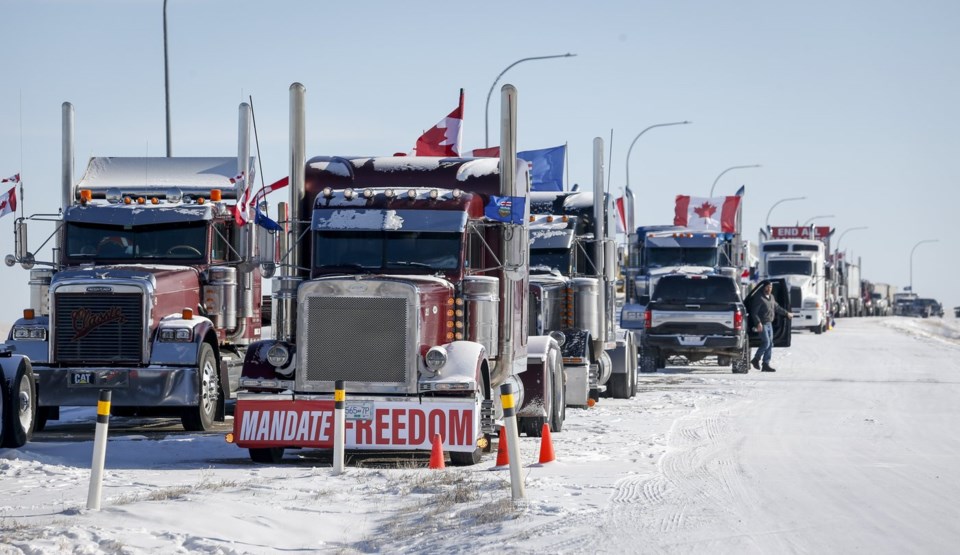LETHBRIDGE, Alta. — A protester at the border blockade at Coutts, Alta., described in court Tuesday a police presence so overwhelming and intimidating that he decided to go home early.
"I observed the helicopter (and) drones. It looked like a scene out of a movie ... a full military program coming at me. On foot, there was probably 30 or 40 RCMP in full riot gear," Daryl Yorgason testified.
"We just decided it was time to go, because we didn't want to get ambushed at night when we were sleeping.
"I was terrified for my dad, my sister ... everybody, my own well-being. It was just absolute chaos."
Yorgason, a truck driver, mechanic and farmer from Stavely, Alta., testified for the defence at the trial of Anthony Olienick and Chris Carbert.
The pair are charged with conspiracy to murder police at the blockade of trucks and other vehicles in 2022. The demonstration lasted for two weeks, tying up traffic at the border crossing between Alberta and the U.S. to protest COVID-19 restrictions and vaccine mandates.
Olienick’s lawyer, Marilyn Burns, has called protesters to the witness stand to paint a picture of her client and others at the blockade as earnest citizens who believed they had a responsibility to act against a totalitarian government that had lost its way and was seeking to end fundamental individual freedoms.
The blockade ended peacefully after police made arrests and seized guns, ammunition and body armour near the protest site.
Yorgason told court he arrived on the first day of the protest.
He said the pandemic caused him to close his trucking business and he, his father, brother-in-law, girlfriend and sister decided to join the demonstration.
"Maybe we could get our lives back. Maybe I could get my job back," Yorgason testified
He said at the start, there was no plan or organization.
"Everybody was trying to figure out what to do. They were trying to get a spokesperson. Nobody had a clue what was going on. It was like herding scared cats," he said.
A couple of days later, he said, everything changed.
"The police had showed up. And then shortly after, in the afternoon, I was sitting in the truck when everything really started getting crazy," he said.
He said his sister and girlfriend went to a hotel for safety.
"The helicopters started hovering by a truck and then the police started coming in like crazy,” he said.
"I phoned my dad. I tried to calm him down. He's had six heart attacks and he was scared. He was terrified and so was I. They're coming in full riot gear at ya."
Yorgason took a photo of nine police officers approaching his truck. He said the RCMP were threatening to arrest anybody who was there.
“All their faces were covered. There were accents I've never heard — I think eastern European, I don't know.”
During cross-examination, Crown prosecutor Matt Dalidowicz asked Yorgason why he noted the foreign accents.
Yorgason said he believed the pandemic had stretched public resources so thinly, “they were bringing in anyone they could find to be down there for a police presence.”
He added, “I was getting scared because they did not seem like they were normal. They did not act like they were normal RCMP or any I have ever dealt with before.”
Dalidowicz asked Yorgason about police actions at the site.
“Did you ever see police officers assault anyone?” Dalidowicz asked.
"No," Yorgason replied.
"Did you ever see police officers shoot anyone?"
"No."
"Did you ever see police officers drag anyone out of their vehicle using force?”
"No.”
Yorgason told court he has not been back to Coutts since.
The Crown has introduced police testimony and weapons evidence to argue the accused were intent on killing Mounties to keep the blockade intact.
Undercover officers have testified Olienick told them he believed police were pawns of government and that if officers came to the blockade he would “slit their throats.”
This report by The Canadian Press was first published July 16, 2024.
— By Bill Graveland in Calgary
The Canadian Press



